Resources/Tips
Tools I used:
-
jadxfor decompiling and viewing the files (dex2jar/jar2dexworks too!) -
Anbox Application Managerto run the app -
adbfor sideloading into the emulator and debugging -
VisualStudioCodefor looking at the files
We at Flare have created our own Tamagotchi pet, the flarebear. He is very fussy. Keep him alive and happy and he will give you the flag.
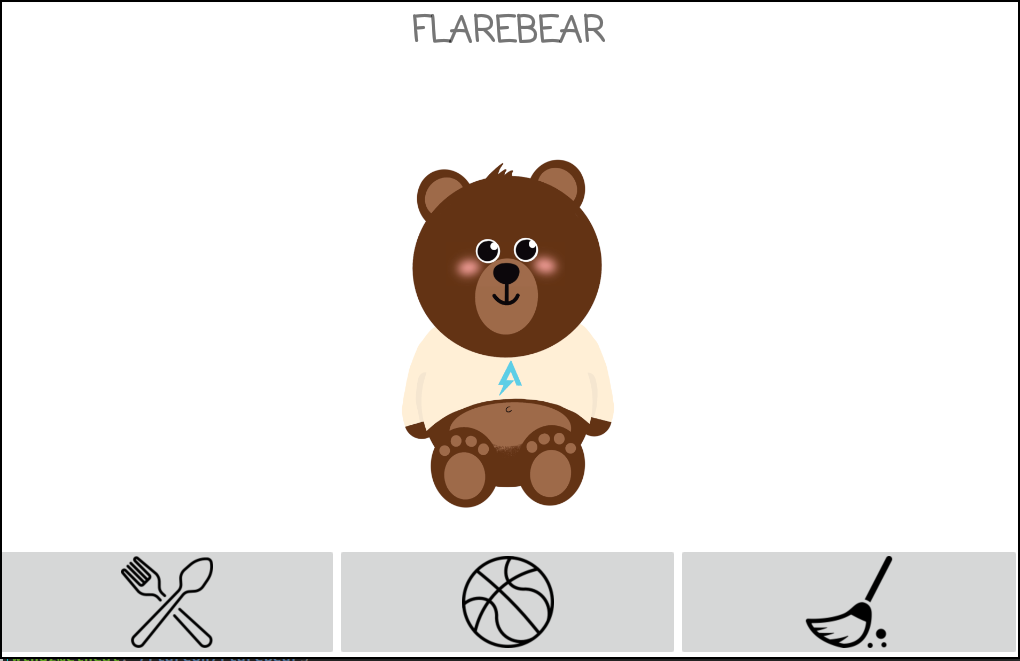
tl;dr
- Do lots of reversing…
-
Fuck up a lot of timesBacktrack and stop overthinking the challenge - Basically you need a proper combination of three actions to trigger the flag state in the bear
Walkthrough
Lets see whats inside the provided flarebear.apk file:
$ jadx -d flarebear flarebear.apk
...
$ ls flarebear
resources sources
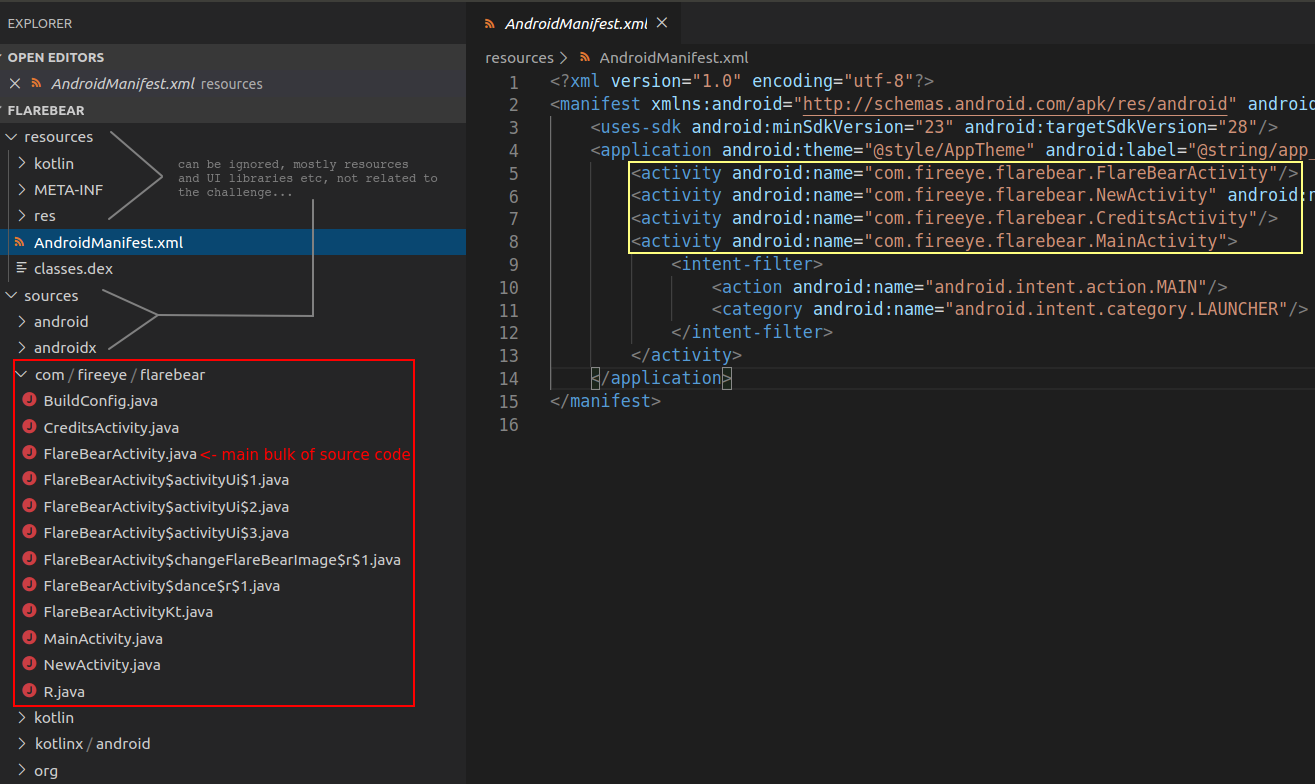
Using anbox and adb, we install the game into an emulator to see what it is all about!
$ adb devices
List of devices attached
emulator-5558 device
$ adb install flarebear.apk
...
After installing through adb, we can see the application within anbox! 
We can then interact with flarebear and see what game mechanics are present:

You can:
- Load Game/ Create New Game
- Give your bear a name
- Feed it
- Play with it
- Clean it
Understandably the bear starts out happy but if you do not feed/play and clean too much it will become sad, feed too much and there will be poo around the screen !!!
This coincides with this function in one of the UI class files: 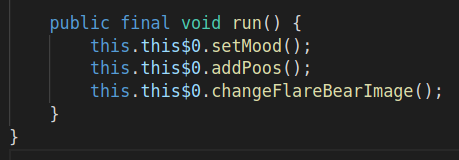
Looking at the setMood() function, we see some interesting things:

Perhaps the most notable one is danceWithFlag() ! The function can only be reached if two conditions are met — isHappy() and isEcstatic()
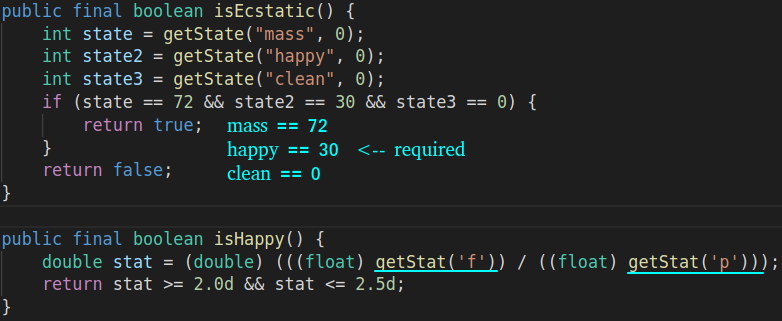
As shown above the conditions for isHappy() — f/p must be between 2 and 2.5
For isEcstatic() it is shown in teal…
Going back to danceWithFlag():
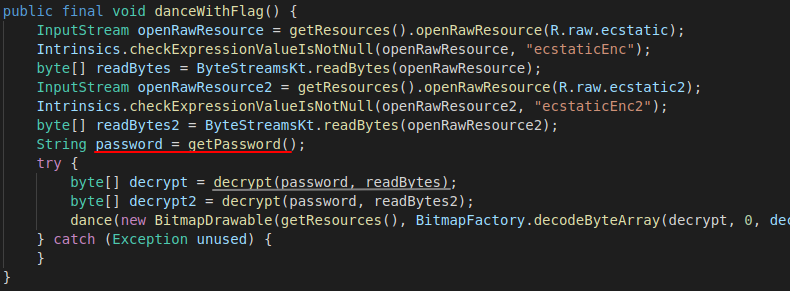
Another two functions of interest are getPassword() and decrypt() ![]()
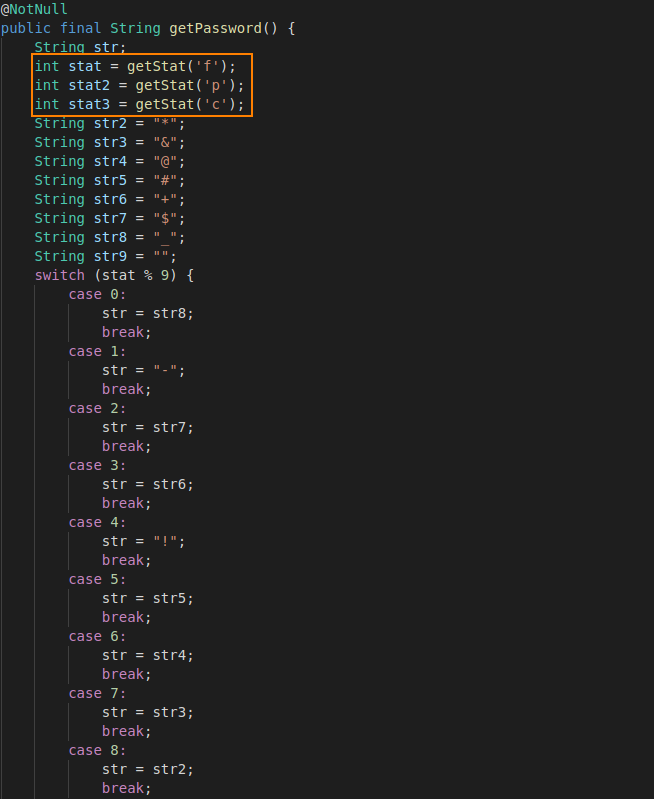
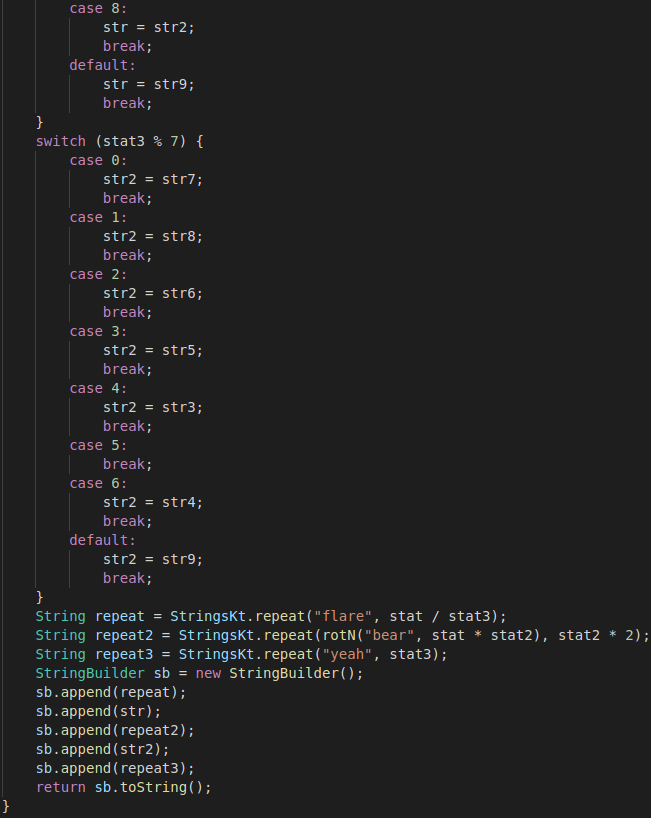 ]
] 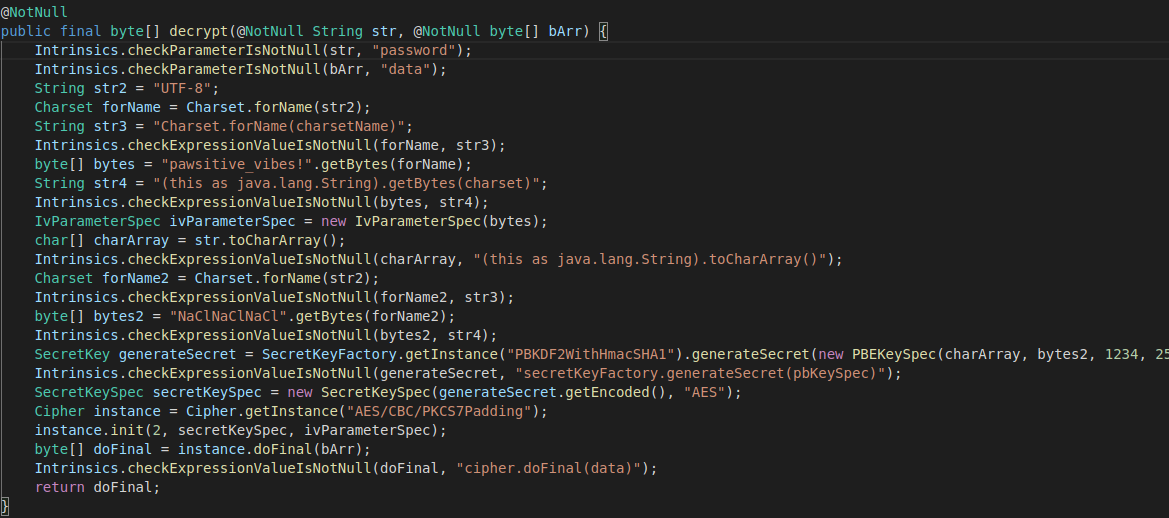
They seem quite complex so we will leave them for later…
From previous screenshots we see that there are getStat() and getState() functions, perhaps there are setStat() and setState() functions too!

Based on what we’ve seen so far, getStat() can take inputs of f,p,c and will return how many times that character occurs in a global Activity string
At this point you might have guessed what those characters stand for:
-
f for food

-
p for play

-
c for clean

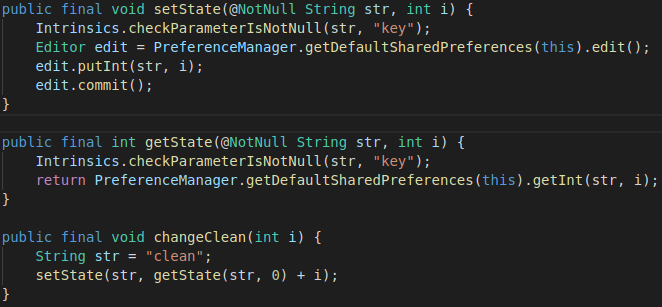
It seems like the State is being stored in some kind of in-memory registry/global dictionary. Get/Set would retrieve/edit the values based on the key given.
There was no setStat() function, however saveActivity() comes pretty close in terms of functionality…
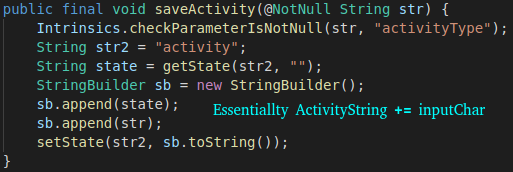
After this, we can move on to the three functions which control the Activity string as well as the three States
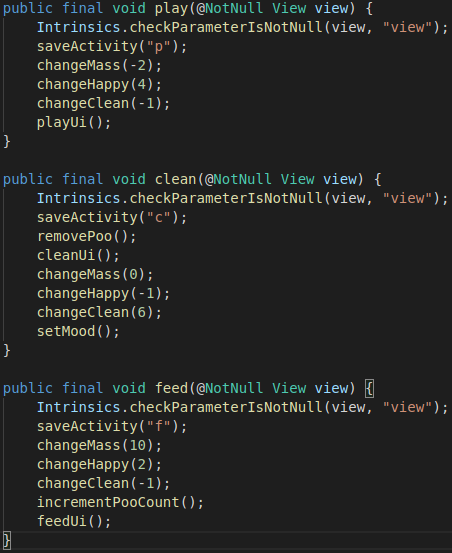
We now know that the only way to reach the isEcstatic() state is to have a right combination of plays, cleans and feeds (in no particular order) which satisfies the two requirements above!
Since it becomes an Algebra problem (solving for four variables over three equations), I wrote a script to help in this process:
#!/usr/bin/python3
# For spamming flarebear stats :)
# Winning combo: ffffffffccpppp
mass = 0
clean = 0
happy = 0
activity = ""
choices = ['f','p','c']
while True:
choice = input("Next move? (f/p/c): ").lstrip().rstrip()
if(choice == 'q'): exit()
if(choice not in choices): continue
activity += choice
if(choice == 'f'):
mass += 10
happy += 2
clean -= 1
elif(choice == 'p'):
mass -= 2
happy += 4
clean -= 1
elif(choice == 'c'):
mass += 0
happy -= 1
clean += 6
print(f"\nMass: {mass}\t Clean: {clean}\t Happy: {happy}")
print(f"Activity: {activity}")
# winning combo
if(mass == 72 and happy == 30 and clean == 0):
print(f"[WIN] ::> {activity}")
break
#=============================================================
An important thing to note is that too many ‘f’s can cause the other stats to spiral out of control, this is preluded by the 2.0 and 2.5 range checks we encountered previously. [KISS principle applies]
Thus I employed this strategy:
- 8 x
fto get 80 mass — However, this causes clean to be -8 - So we do 2 x
cand bring clean up to positive levels - We then finish off with 4 x
p— too many clean and not happy (only 14)
With this final combination, we get the flag from our happy bear ![]()
![]()
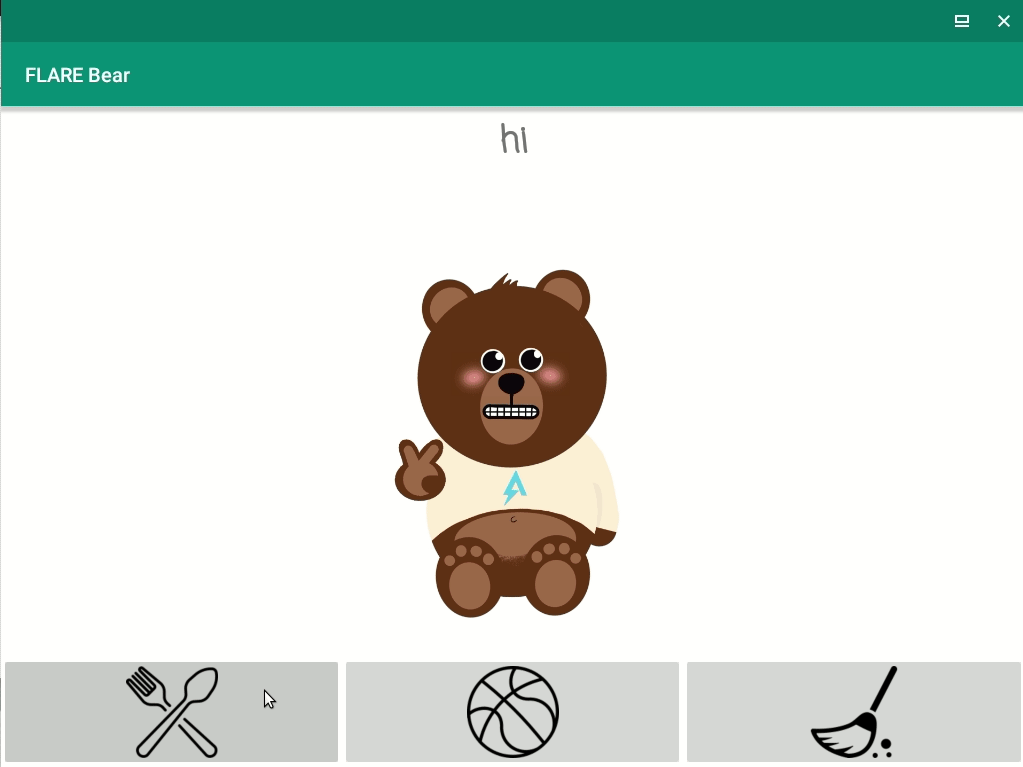
What I learned
- First proper foray into Mobile Reversing… sort of.
-
smaliis almost like a intermediate language betweendexand source, similar to assembly - Somtimes its better to follow the natural order of reversing than to try and reverse from back to front…
- I spent too long looking at the
decryptandgetPasswordfunctions - I ended up neglecting the actual challenge involving State and Stats
- I spent too long looking at the